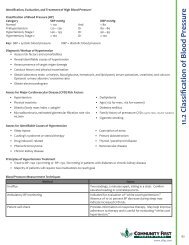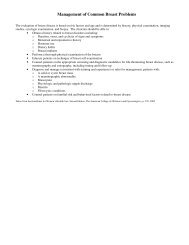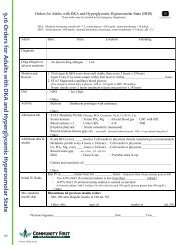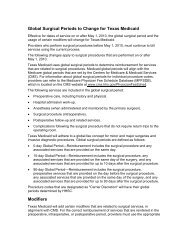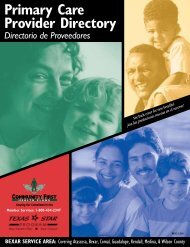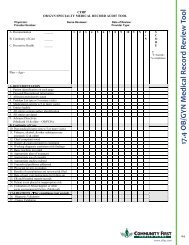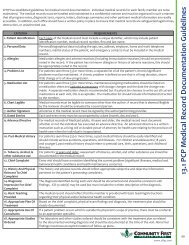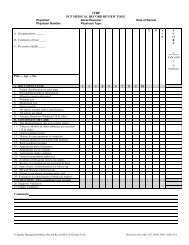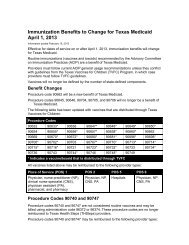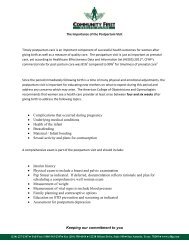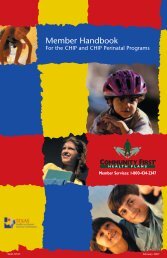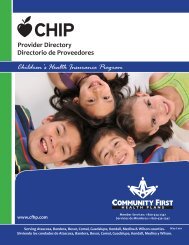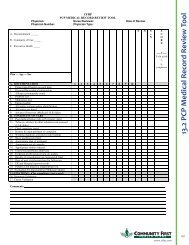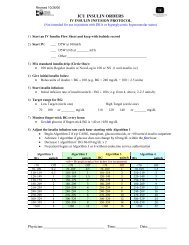Full Clinical Guidelines - Community First Health Plans.
Full Clinical Guidelines - Community First Health Plans.
Full Clinical Guidelines - Community First Health Plans.
You also want an ePaper? Increase the reach of your titles
YUMPU automatically turns print PDFs into web optimized ePapers that Google loves.
TEXAS MEDICAID PROVIDER PROCEDURES MANUAL: VOL. 2<br />
CH.54<br />
Mental <strong>Health</strong> Parent Questionnaire (Ages 10–12 Years) (2 Pages)<br />
Mental <strong>Health</strong> Parent Questionnaire (Ages 10–12 Years) (2 Pages)<br />
Mental <strong>Health</strong> Parent Questionnaire<br />
Child’s Name: _____________________________<br />
Birth Date: ________________________________<br />
Ages 10 to 12 Years<br />
Today’s Date: _____________________________<br />
To the Parent: If you will assist us by filling out this form, we can help you find your child’s strengths and any problem<br />
areas, too. Your answers will help us to know if we need to talk with you and find out more about your child. Please<br />
check all items below that are true for your child. Some of the behaviors noted may be normal but if you are concerned<br />
please let us know.<br />
F<br />
e<br />
e<br />
l<br />
i<br />
n<br />
g<br />
s<br />
Does your child (do you) show feelings that concern you or seem strange for their (your) age? ❑ Yes ❑ No<br />
❑ Is restless<br />
❑ Is sad or cries easily<br />
❑ Is guilty<br />
❑ Is irritable or angers easily<br />
❑ Is sullen<br />
❑ Is fearful<br />
❑ Is bored<br />
B<br />
e<br />
h<br />
a<br />
v<br />
i<br />
o<br />
r<br />
Does your child (do you) often do things that seem strange for their (your) age? ❑ Yes ❑ No<br />
❑ Has problems in school<br />
❑ Threatens or harms other children or animals<br />
❑ Lacks interest in things s/he used to enjoy<br />
❑ Is involved in sexual activity<br />
❑ Destroys possessions or other property<br />
❑ Steals<br />
❑ Refuses to talk<br />
❑ Sets fires<br />
❑ Is overactive<br />
❑ Hurts himself or herself<br />
❑ Has been in trouble with the police<br />
S<br />
o<br />
c<br />
i<br />
a<br />
l<br />
I<br />
n<br />
t<br />
e<br />
r<br />
a<br />
c<br />
t<br />
i<br />
o<br />
n<br />
Do you have any concerns about how your child (you) get(s) along with family members? ❑ Yes ❑ No<br />
With other adults? ❑ Yes<br />
❑ No<br />
With other children? ❑ Yes ❑ No<br />
❑ Prefers to be alone<br />
❑ Has a hard time making and keeping friends<br />
❑ Is defiant, a disciplinary problem<br />
❑ Picks on others a lot or often gets into fights (hitting, etc.)<br />
❑ Argues too much<br />
❑ Will not go to school<br />
T<br />
h<br />
i<br />
n<br />
k<br />
i<br />
n<br />
g<br />
Are any of these a problem for your child (you)? ❑ Yes ❑ No<br />
❑ Is frequently confused (does not understand what is<br />
going on)<br />
❑ Daydreams a lot<br />
❑ Is distracted, doesn’t pay attention<br />
❑ Has very strange thoughts<br />
❑ Schoolwork is slipping (grades going down)<br />
❑ Does not trust others<br />
❑ Sees or hears things that are not there<br />
❑ Blames others for his/her misdeeds or thoughts<br />
❑ Talks about death or suicide a lot<br />
❑ Often cannot remember things<br />
132 H EALTH PLANS<br />
www.cfhp.com<br />
CH-326<br />
CPT ONLY - COPYRIGHT 2010 AMERICAN MEDICAL ASSOCIATION. ALL RIGHTS RESERVED.



